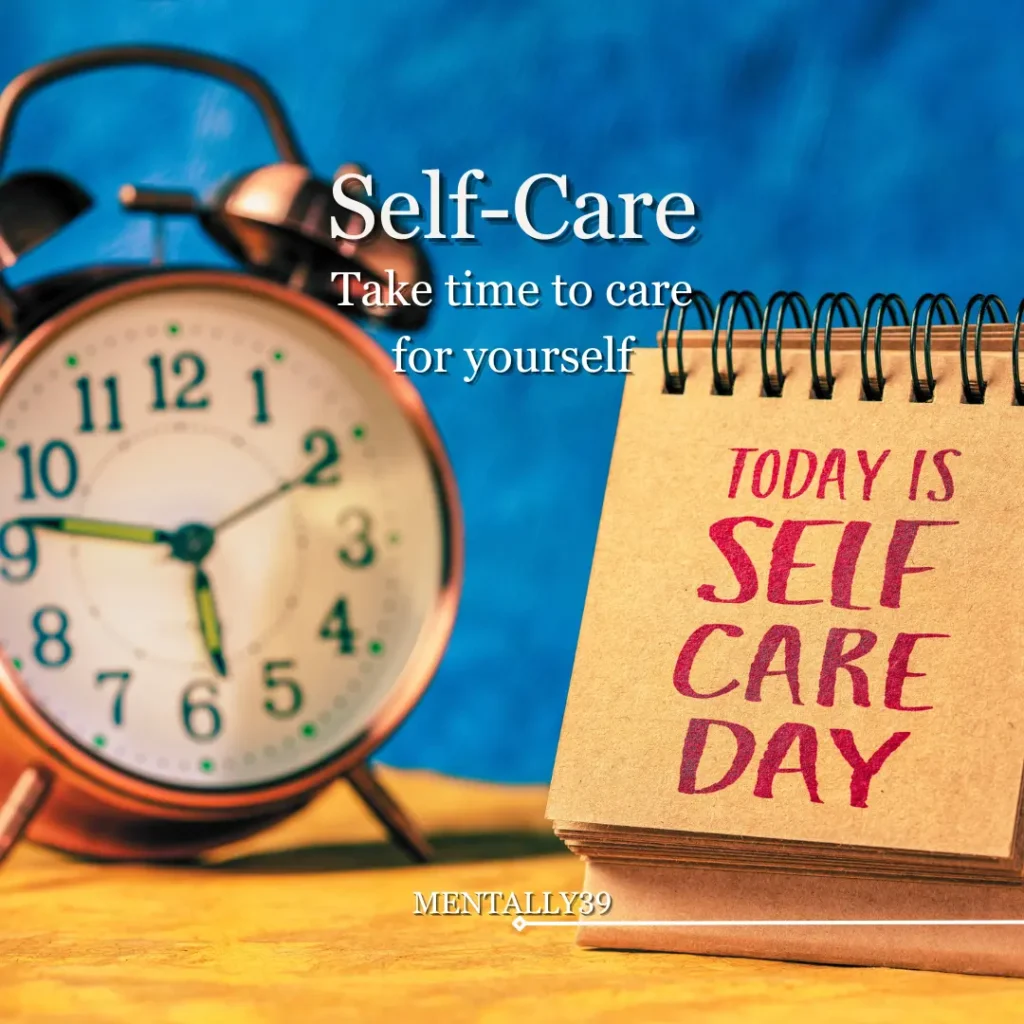Self-care is often overlooked, especially by people who are busy with work and other responsibilities. However, taking care of oneself is important for maintaining good physical and mental health and can improve overall quality of life. This post will discuss five simple self-care goals that busy people can include in their daily routines.
By setting achievable and realistic goals for getting enough rest, exercising regularly, eating healthily, building positive relationships, and making time for reflection and mindfulness, busy individuals can prioritize their own well-being and lead a more balanced and fulfilling life.
Understanding Self-Care
Before we discuss the self-care goals, let’s first understand what self-care truly means. Self-care is about taking planned steps to care for your physical, emotional, and mental health. It includes activities and practices that improve overall well-being and help you live a healthier, happier life.
Self-care is not selfish but a critical aspect of personal growth and self-preservation. By dedicating time and effort to self-care, you prioritize your needs and ensure you have the physical and mental energy to handle life’s challenges.
Why is it important to set self-care goals?
Setting self-care goals is important so you prioritize taking care of yourself regularly. By setting specific goals, you’re more likely to actually do things that help improve your well-being and reduce stress. Taking care of your physical and mental health is important so you can manage stress, avoid burnout, and stay healthy.
Setting self-care goals can help you make time for activities that support your emotional and mental health. When you neglect self-care, it can lead to mental health problems like anxiety and depression, as well as physical health issues like high blood pressure, heart problems, and weaker immune systems that could make you sick.
How Self-Care Contributes to Overall Well-being
Self-care is all about taking care of yourself and promoting overall health and well-being. It means doing things that help your body, mind, and emotions feel better. By practicing self-care, you’re taking steps to meet your physical, emotional, and mental health needs in a positive way.
Regular self-care activities can help you stay healthy by getting enough sleep, exercising, and eating well. It also plays an important role in improving your mental health, reducing the risk of mental illness, and enhancing emotional well-being.
When you take care of your mental and emotional health, you give yourself the tools to handle stress, make better decisions, and balance your work and personal life. Practicing self-care can help you lead a healthy and fulfilling life where you can thrive and reach your objectives.

Establishing Goals for Self-Care
Making self-care a priority is important for controlling your well-being. Setting goals can help you achieve this. When you set clear objectives and actionable goals, you can guide your self-care journey and stay motivated to maintain a healthy and balanced lifestyle.
The Role of Self-Care Goals
It’s important to make plans to take care of yourself. This can help you grow and feel better. When you set goals for self-care, you’re saying that you want to take care of yourself. These goals can be specific and have a time limit. They can include things like sleeping, exercising, eating healthy, and feeling good mentally. Setting goals to care for yourself helps you stay on track and feel good about what you’ve accomplished.
Setting Achievable and Realistic Self-Care Goals
It’s important to set realistic objectives that can be accomplished given your situation. If your goals are too difficult, it can lead to disappointment and frustration, making it hard for you to continue your self-care routine.
When setting goals, think about how much time you have and the resources you can use. It’s important to choose goals that are meaningful and possible for you. You can break down your goals into smaller steps that you can complete in a reasonable amount of time.
SMART goals are a great way to set achievable self-care goals. They help you make your goals specific, measurable, attainable, relevant, and time-bound. Adding these elements can increase your chances of succeeding with your self-care goals and living a healthy, balanced life.
Goal 1: Prioritizing Restful Sleep
Getting a good night’s sleep is super important for your health. It’s a good idea to plan for how much sleep you want each night because it can help your mental health. Sleeping enough can help lower your risk of high blood pressure and heart disease.
You can set specific and doable goals, like making sure you get a certain number of hours of sleep or creating a bedtime routine to help you relax. Taking time to rest will help you feel more energized and focused, which is great for your overall well-being.
Strategies for Improving Sleep Quality
Having a calming bedtime routine is important to sleep better, use relaxation techniques, and be mindful. Avoiding blue light from screens and making the sleep environment comfortable can also help.
Doing physical activity and managing stress can improve the length and quality of your sleep. Before bedtime, try meditating, doing yoga, or practicing relaxation exercises. It’s important to have consistent sleep habits, like going to bed at the same time each night, for your overall well-being and better sleep.
Goal 2: Engaging in Regular Physical Activity
Incorporating physical activity into your routine can improve your overall well-being and set goals for a healthier lifestyle. Exercise is good for your body and mind, reducing the risk of high blood pressure, heart disease, and loneliness. Setting realistic objectives related to physical activity can help you prioritize your health. Start by dedicating specific days or times each week to exercise. It’s an essential aspect of wellness.
Practical Tips for Incorporating Exercise into a Busy Schedule
Prioritize your physical well-being by setting smart goals for personal care. Make sure to schedule time for exercise in your daily routine to promote overall health. Include physical activities into your regular schedule and make time for relaxation and physical care. Remember, taking care of your body is a crucial part of your overall health care, so ensure that you prioritize exercise and give it the attention it deserves.
Goal 3: Promoting Healthy Eating Habits
It’s important to eat well to stay healthy. Eating healthy meals can help you feel good, both physically and mentally. Planning your meals and setting goals for healthy eating can help you take control of your diet. Eating a balanced diet with fruits, vegetables, whole grains, and lean protein can give you more energy and improve your mood.
It’s best to avoid sugary and processed foods to prevent energy crashes and mood swings. Drinking plenty of water can also help you stay hydrated and feel better. Making small changes to your eating habits can make a big difference in how you feel.
Simple Ways to Make Healthy Food Choices
Making healthy food choices is important for overall well-being. You can start by planning ahead and making a weekly meal schedule with a grocery list to keep healthy options available.
Batch cooking allows you to prepare meals in advance, ensuring quick and easy access to nutritious food throughout the week. Opt for whole foods like fruits, vegetables, whole grains, lean proteins, and healthy fats to fuel your body. Pay attention to how different foods make you feel, and adjust your diet accordingly to support your health and wellness.

Goal 4: Cultivating Positive Relationships
Having positive relationships is crucial for self-care and overall well-being. Nurturing meaningful connections is important because it can provide emotional support and reduce stress. Building healthy relationships can enhance mental health, combat loneliness, and promote gratitude. Taking care of your social connections is as important as taking care of your body. You can strengthen your support system and experience the mental health benefits of positive relationships by setting goals to spend quality time with loved ones. Cultivating positive relationships should be one of your smart goals for a well-rounded self-care plan.
Tips for Nurturing Meaningful Relationships
Nurturing meaningful relationships is essential for overall well-being and happiness. Set plans for spending quality time with loved ones can help create a strong support system. It’s important to prioritize free time for social interactions and express gratitude for the people in your life. According to Mental Health America, positive relationships have mental health benefits and can reduce feelings of loneliness. Engaging in activities together, like healthy meals or regular exercise, is a great way to strengthen bonds and care for your body.
Goal 5: Making Time for Mindfulness and Gratitude
Taking care of yourself for your overall health and well-being is essential. When creating your plan, ensure you have enough time to prioritize self-care. This means taking time to acknowledge your thoughts and feelings and being present.
Doing so can reduce stress and improve physical well-being. You can boost your mental health and gratitude by reflecting on your life and practicing mindfulness. Set aside time every day for self-reflection and mindfulness to take care of yourself.
How to Incorporate Mindfulness and Gratitude Practices into Daily Life
Incorporating mindfulness into daily life is vital for reducing stress and increasing self-awareness. Try integrating mindfulness into everyday activities, such as eating and walking, to attain a more balanced life.
Allocate time for meditation and deep breathing exercises to enhance mental well-being. Take a few minutes in the morning and think; better still, write down 3-5 things you are grateful for; this helps put the positive in the front of your mind.
Are Your Self-Care Goals Aligned with Your Lifestyle?
Evaluate if your self-care plans align with your lifestyle by considering your schedule and priorities. Set smart goals that strike a balance between work, family, and personal wellness. Regularly reassess and adapt your goals to accommodate life’s changes. Involve loved ones in creating a supportive environment. Prioritize self-care through scheduled activities and relaxation.
Closing
Self-care is important to maintain a healthy and balanced life, especially for people with busy schedules. By setting achievable goals, you can focus on getting enough restful sleep, exercising regularly, eating healthily, building positive relationships, and practicing mindfulness.
These self-care goals help improve your overall well-being, including your mental and physical health, energy levels, mood, and productivity. Remember that taking care of yourself is not selfish but necessary for a fulfilling life. Try starting small, staying consistent, and enjoying the benefits of a healthier lifestyle.

20+ Years as a Special Education Teacher
NASM Certified Nutrition Coach,
Certified Trauma Informed Trainer
Mindset and Motivation Master Life Coach
